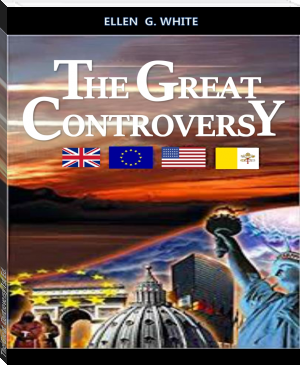The Great Controversy 1st Ed. by Ellen G. White (read out loud books TXT) 📕

- Author: Ellen G. White
Book online «The Great Controversy 1st Ed. by Ellen G. White (read out loud books TXT) 📕». Author Ellen G. White
The Great Controversy 1st Ed. Table of Contents
Chapter 1. World History Predicted.
Chapter 2. Ignited Fires of Persecution.
Chapter 3. Era of Darkness.
Chapter 4. A Peculiar People.
Chapter 5. Champion of Truth.
Chapter 6. Two Heroes.
Chapter 7. A Revolution Begins.
Chapter 8. Tried Before the Council
Chapter 9. Reform in Switzerland.
Chapter 10. Reform in Germany.
Chapter 11. Princely Protest
Chapter 12. The French Reformation.
Chapter 13. The Netherlands and Scandinavia.
Chapter 14. England’s Reforms.
Chapter 15. The French Revolution.
Chapter 16. Land of Liberty.
Chapter 17. Heralds of the Morning.
Chapter 18. An American Reformer.
Chapter 19. Light Through Darkness.
Chapter 20. The Awakening.
Chapter 21. A Warning Rejected.
Chapter 22. Prophecies Fulfilled.
Chapter 23. What is the Sanctuary?.
Chapter 24. The Most Holy Place.
Chapter 25. God's Law.
Chapter 26. A Work of Reform.
Chapter 27. Revival
Chapter 28. Facing Life's Record.
Chapter 29. Why So Much Suffering?.
Chapter 30. Infernal Enmity.
Chapter 31. Evil Spirits.
Chapter 32. Deadly Deceptions Exposed.
Chapter 33. First Great Deception.
Chapter 34. Can Our Dead Speak to Us?.
Chapter 35. Liberty of Conscience Threatened.
Chapter 36. The Impending Conflict
Chapter 37. The Only Safeguard.
Chapter 38. The Final Warning.
Chapter 39. Anarchy Unleashed.
Chapter 40. Great Deliverance.
Chapter 41. Final Judgments.
Chapter 42. Controversy Ended.
Chapter 1. World History Predicted
"If thou hadst known, even thou, at least in this thy day, the things which belong unto thy peace! but now they are hid from thine eyes. For the days shall come upon thee, that thine enemies shall cast a trench about thee, and compass thee round, and keep thee in on every side, and shall lay thee even with the ground, and thy children within thee; and they shall not leave in thee one stone upon another; because thou knewest not the time of thy visitation." Luke 19:42-44.
From the crest of Olivet, Jesus looked upon Jerusalem. Fair and peaceful was the scene spread out before Him. It was the season of the Passover, and from all lands the children of Jacob had gathered there to celebrate the great national festival. In the midst of gardens and vineyards, and green slopes studded with pilgrims' tents, rose the terraced hills, the stately palaces, and massive bulwarks of Israel's capital. The daughter of Zion seemed in her pride to say, I sit a queen and shall see no sorrow; as lovely then, and deeming herself as secure in Heaven's favour, as when, ages before, the royal minstrel sang: "Beautiful for situation, the joy of the whole earth, is Mount Zion, . . . the city of the great King." Psalm 48:2. In full view were the magnificent buildings of the temple. The rays of the setting sun lighted up the snowy whiteness of its marble walls and gleamed from golden gate and tower and pinnacle.
"The perfection of beauty" it stood, the pride of the Jewish nation. What child of Israel could gaze upon the scene without a thrill of joy and admiration! But far other thoughts occupied the mind of Jesus. "When He was come near, He beheld the city, and wept over it." Luke 19:41. Amid the universal rejoicing of the triumphal entry, while palm branches waved, while glad hosannas awoke the echoes of the hills, and thousands of voices declared Him king, the world's Redeemer was overwhelmed with a sudden and mysterious sorrow. He, the Son of God, the Promised One of Israel, whose power had conquered death and called its captives from the grave, was in tears, not of ordinary grief, but of intense, irrepressible agony.
His tears were not for Himself, though He well knew whither His feet were tending. Before Him lay Gethsemane, the scene of His approaching agony. The sheepgate also was in sight, through which for centuries the victims for sacrifice had been led, and which was to open for Him when He should be "brought as a lamb to the slaughter." Isaiah 53:7. Not far distant was Calvary, the place of crucifixion. Upon the path which Christ was soon to tread must fall the horror of great darkness as He should make His soul an offering for sin. Yet it was not the contemplation of these scenes that cast the shadow upon Him in this hour of gladness. No foreboding of His own superhuman anguish clouded that unselfish spirit. He wept for the doomed thousands of Jerusalem--because of the blindness and impenitence of those whom He came to bless and to save.
The history of more than a thousand years of God's special favour and guardian care, manifested to the chosen people, was open to the eye of Jesus. There was Mount Moriah, where the son of promise, an unresisting victim, had been bound to the altar--emblem of the offering of the Son of God. There the covenant of blessing, the glorious Messianic promise, had been confirmed to the father of the faithful. Genesis 22:9, 16-18. There the flames of the sacrifice ascending to heaven from the threshing floor of Ornan had turned aside the sword of the destroying angel (1 Chronicles 21)-- fitting symbol of the Saviour's sacrifice and mediation for guilty men. Jerusalem had been honoured of God above all the earth. The Lord had "chosen Zion," He had "desired it for His habitation." Psalm 132:13.
There, for ages, holy prophets had uttered their messages of warning. There priests had waved their censers, and the cloud of incense, with the prayers of the worshipers, had ascended before God. There daily the blood of slain lambs had been offered, pointing forward to the Lamb of God. There Jehovah had revealed His presence in the cloud of glory above the mercy seat. There rested the base of that mystic ladder connecting earth with heaven (Genesis 28:12; John 1:51)-- that ladder upon which angels of God descended and ascended, and which opened to the world the way into the holiest of all. Had Israel as a nation preserved her allegiance to Heaven, Jerusalem would have stood forever, the elect of God. Jeremiah 17:21-25. But the history of that favoured people was a record of backsliding and rebellion. They had resisted Heaven's grace, abused their privileges, and slighted their opportunities.
Although Israel had "mocked the messengers of God, and despised His words, and misused His prophets" (2 Chronicles 36:16), He had still manifested Himself to them, as "the Lord God, merciful and gracious, long-suffering, and abundant in goodness and truth" (Exodus 34:6); notwithstanding repeated rejections, His mercy had continued its pleadings. With more than a father's pitying love for the son of his care, God had "sent to them by His messengers, rising up betimes, and sending; because He had compassion on His people, and on His dwelling place." 2 Chronicles 36:15. When remonstrance, entreaty, and rebuke had failed, He sent to them the best gift of heaven; nay, He poured out all heaven in that one Gift.
The Son of God Himself was sent to plead with the impenitent city. It was Christ that had brought Israel as a goodly vine out of Egypt. Psalm 80:8. His own hand had cast out the heathen before it. He had planted it "in a very fruitful hill." His guardian care had hedged it about. His servants had been sent to nurture it. "What could have been done more to My vineyard," He exclaims, "that I have not done in it?" Isaiah 5:1-4. Though when He looked that it should bring forth grapes, it brought forth wild grapes, yet with a still yearning hope of fruitfulness He came in person to His vineyard, if haply it might be saved from destruction. He digged about His vine; He pruned and cherished it. He was unwearied in His efforts to save this vine of His own planting.
For three years the Lord of light and glory had gone in and out among His people. He "went about doing good, and healing all that were oppressed of the devil," binding up the broken-hearted, setting at liberty them that were bound, restoring sight to the blind, causing the lame to walk and the deaf to hear, cleansing the lepers, raising the dead, and preaching the gospel to the poor. Acts 10:38; Luke 4:18; Matthew 11:5. To all classes alike was addressed the gracious call: "Come unto Me, all ye that labour and are heavy-laden, and I will give you rest." Matthew 11:28.
Though rewarded with evil for good, and hatred for His love (Psalm 109:5), He had steadfastly pursued His mission of mercy. Never were those repelled that sought His grace. A homeless wanderer, reproach and penury His daily lot, He lived to minister to the needs and lighten the woes of men, to plead with them to accept the gift of life. The waves of mercy, beaten back by those stubborn hearts, returned in a stronger tide of pitying, inexpressible love. But Israel had turned from her best Friend and only Helper. The pleadings of His love had been despised, His counsels spurned, His warnings ridiculed.
The hour of hope and pardon was fast passing; the cup of God's long-deferred wrath was almost full. The cloud that had been gathering through ages of apostasy and rebellion, now black with woe, was about to burst upon a guilty people; and He who alone could save them from their impending fate had been slighted, abused, rejected, and was soon to be crucified. When Christ should hang upon the cross of Calvary, Israel's day as a nation favoured and blessed of God would be ended. The loss of





Comments (0)